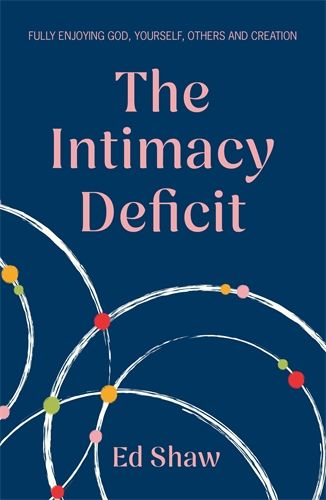Ed Shaw, The Intimacy Deficit: Fully Enjoying God, Yourself, Others and Creation (IVP, 2025)
Ed Shaw’s latest book is not about sex which, he says in the introduction, may come as a relief to some. Instead, it’s about something far more important – intimacy, or what he calls ‘fullness through connection’ (p.3). The book is short, succinct, insightful and practical. It’s a book that might just change the way you see the world.
The book is short, succinct, insightful and practical. It’s a book that might just change the way you see the world.
Ed’s essential idea is that a healthy life involves enjoying intimacy with God, with ourselves, with others, and with our world. He says that as we increase in one, we’ll naturally become more able to experience it in the others, and in this way, Ed sets out what he calls ‘a virtuous cycle’ (p.108).
The book is neatly arranged into four parts: intimacy with God, with yourself, with others, and with creation. Each part contains an overview of the subject, followed by a practical chapter offering ideas for application. It’s easy to read, is just over 100 pages long, and would make a perfect companion for devotional times or lunch breaks, or could be a great group discussion book.
Ed has an amazing gift at pulling ideas together from a wide range of sources, so much so that reading it felt like visiting a Turkish Bazaar. The longer I lingered, the more treasures he presented to me. He quotes from poems, pastors, puritans, paintings, preachers, philosophers, pop songs and more (although not all of them begin with ‘p’).
Ed’s ability to source and resource is vast, but that isn’t to suggest he hides behind others. One of the really charming aspects of the book was how disarmingly honest and, at times, vulnerable Ed is. His book isn’t a dispassionate study of an interesting subject (intimacy) but instead reads like talking to a tour guide. Sure, he’s leading the trip and stopping to show us important spots, but as we walk he opens up about his own reasons for being interested in the subject, he shares his own sadnesses and temptations and he offers us hope for our own lives
Intimacy with God
The book begins where we might expect, with God, but Ed brings fresh light to bear on a familiar subject. He starts with the idea that God wants to be our father, friend and fiancée. The chapter that explores how we might grow in our intimacy with God contains perhaps my favourite idea in the book: adopting a psalm.
Ed suggests this idea and then shows us how he has ‘adopted’ Psalm 23, something he says involved him saying, reading, studying, learning, singing, praying, applying, painting, imagining and experiencing Psalm 23 for himself. What a fantastic idea to try with a psalm for yourself!
Intimacy with yourself
Following this section comes his chapters on enjoying ‘intimacy with yourself’, which I’ve got to admit (and this is perhaps my only criticism of the book) is a hard thing to suggest without raising a few eyebrows or eliciting a few sniggers. However, the point he makes in this chapter is incredibly important.
Ed points out how rare it is that any of us seem free and able to ‘delight in ourselves’ in the way that King David does in Psalm 139: ‘I praise you for I am fearfully and wonderfully made.’ David thanks God for making him just the way he has. When did you last pray the same?
 Intimacy with others
Intimacy with others
This section is a game-changer, especially in societies like ours. God created us with a need for intimate relationships with others. As Ed explains, ‘to flourish, every human being must be part of a whole network of intimate relationships’ (p. 57). It’s a much-needed message. Ed shares the important insight that ‘nuclear families [often] collapse under the pressure to meet all of its members relational needs’ (p.57) and gives a helpful description of the value of differing kinds of friendship. I loved his insight, quoted from James K. A. Smith, that intergenerational relationships are ‘akin to time-travel’ (p.63). We need (I needed) this chapter.
Intimacy with creation
‘Bird watchers seldom get nervous breakdowns’ says John Stott, and Ed agrees (p.99), talking in this section about the importance of ‘slowing down, enjoying God’s creation’ and ‘connecting with the beauty around us’ (p.99). He writes, ‘we need to learn to appreciate both the beauty God has created and the beauty he has enabled and encouraged us to create too’ (p.88).
Intimacy audit
The book concludes with an invitation to take an ‘intimacy audit’, an idea that is really helpful and underlines the applicability of the book’s central idea.
This book deserves to be read by as many people as possible since it offers a much-needed diagnosis of and prescription for much of the malaise of our age. Forget the new series on Netflix and binge on this. Anyone who’s interested in the care of souls also ought to read this book, keeping a few by their desk to give away. It’s a sermon series waiting to be preached, a three-day retreat waiting to be created, and a reliable framework for anyone interested in fostering healthy team cultures at work or in a community group.
If you’re perplexed as to why listening to sermons or reading your Bible isn’t ‘working’ anymore, if you’re struggling to find meaningful and fulfilling activity in the world, or if you’re concerned about the loneliness you’ve grown accustomed to, then this book is for you. What you need isn’t more knowledge, it’s deeper intimacy, and this book will help you find just that.
I can’t recommend it highly enough.





